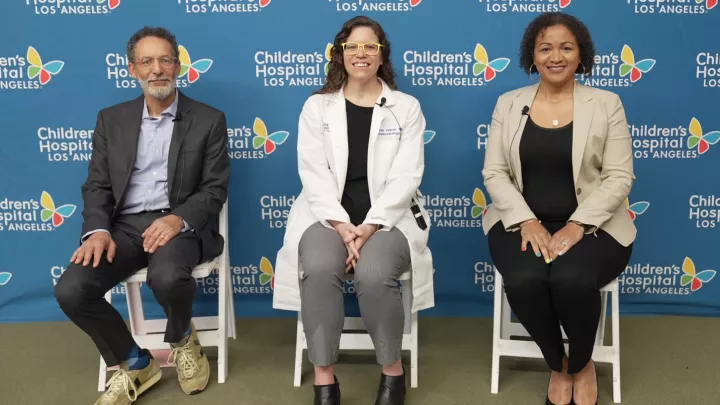
Q&A: When Is Bariatric Surgery Right for Youth With Obesity?
Just one year after launching bariatric surgery services for children and adolescents with obesity, Children’s Hospital Los Angeles has become one of the largest pediatric centers in the country for this procedure—performing 70 surgeries in the program’s first year.
For the program Medical Director Alaina Vidmar, MD, and Surgical Director Kamran Samakar, MD, that number speaks volumes about the need for bariatric surgery in pediatric patients. At CHLA, surgery is just one piece of a comprehensive Healthy Weight Clinic that offers robust, holistic obesity care, which also includes intensive lifestyle modifications and obesity medications.
Dr. Vidmar and Dr. Samakar share how they approach patients, the novel way they incorporate obesity medications—and why age is not a limiting factor.
Why is surgery an important option for young patients with obesity?

Dr. Vidmar: Bariatric surgery is currently the most effective and durable treatment for severe obesity. In the first year after surgery, youth typically experience weight loss of around 50% to 70% of excess body weight, with many losing anywhere from 60 to 100 pounds.
Along with significant weight loss, we also see rapid improvements in key health markers such as blood sugar control, fat in the liver, blood pressure, and sleep quality. The changes are transformative, offering sustained weight reduction and dramatically improved quality of life.
Dr. Samakar: Bariatric surgery can be a crucial support for youth dealing with complex chronic diseases where obesity is significantly impacting both treatment and quality of life. For example, a child with severe obstructive sleep apnea who had been using a CPAP machine to sleep is now able to sleep without it after surgery, thanks to significant weight loss.
Similarly, a young patient with kidney failure may previously be ineligible for a kidney transplant due to their high BMI. After undergoing bariatric surgery and losing weight, they are now eligible to be listed for a transplant. In both cases, weight loss through surgery not only improved the children’s immediate health but also made it easier to manage their underlying conditions, ultimately leading to a better quality of life.
Alaina Vidmar, MDAlmost every patient we've worked with has said, “I wish I had known about this option earlier."
When do you consider bariatric surgery?
Dr. Vidmar: We follow evidence-based guidelines from the American Academy of Pediatrics - Opens in a new window, as well as the American Society of Metabolic and Bariatric Surgery and International Federation for the Surgery of Obesity and Metabolic Disorders - Opens in a new window. These guidelines now recommend offering bariatric surgery to children with class 3 obesity (severe obesity), as well as those with class 2 obesity who have at least one obesity-related condition, such as type 2 diabetes.
This represents a major paradigm shift in how we approach pediatric obesity. Historically, children had to fail other treatments, no matter how serious their condition, before surgery was even considered. Today, however, we may discuss the possibility of bariatric surgery right at a patient’s first visit—especially if their obesity-related health issues are severe. This change allows for earlier intervention and a more proactive approach to managing the health risks of obesity.
Dr. Samakar: Intensive lifestyle and behavioral therapy remains a crucial part of comprehensive care for obesity. However, for patients with severe obesity, lifestyle changes alone have a 95% failure rate in the long term. In fact, there’s no other chronic disease where we would recommend a treatment that we know is so unlikely to succeed. This is why, for many patients, bariatric surgery is an essential option—it offers a more sustainable path to lasting health improvements.
What is your approach for younger children?

Dr. Samakar: Most of our patients are teenagers, but we intentionally did not set a minimum age. We make treatment decisions based on the individual patient. It’s important to recognize that bariatric surgery is just one tool in the toolkit—it is not the right choice for everyone. We take an individualized approach, tailoring treatment plans to each patient's unique needs and circumstances. The best treatment is always the one that is most appropriate for that patient.
Dr. Vidmar: Our youngest surgical patient so far was 10 years old, but we’re currently evaluating several children between the ages of 7 and 10 who have severe obesity and multiple obesity-related conditions. The goal is to determine if surgery could help prevent or reduce serious, life-limiting complications associated with their condition, improving both their health and quality of life in the long term.
How safe is bariatric surgery?
Dr. Samakar: All surgeries carry some level of risk, but when bariatric surgery is performed at an institution with a comprehensive, interdisciplinary program like CHLA, the risk of a major complication from a gastric sleeve is less than 1%. In fact, the risks of this procedure are often lower than those of more common abdominal surgeries, such as an appendectomy.
That said, we have seen cases where patients who traveled abroad for surgery required a revised gastric sleeve. This highlights just how important it is for patients to receive care at a highly experienced, multidisciplinary center like CHLA. Specialized care ensures better outcomes, reduces complications, and provides the comprehensive support necessary for long-term success.
Kamran Samakar, MDObesity is a chronic disease with multiple contributing factors. We take a multidisciplinary approach to ensure that each patient receives the best possible treatment plan.
What role do obesity medications play after surgery?
Dr. Vidmar: At most centers, the standard protocol is to stop obesity medications after bariatric surgery. However, there is limited evidence to support this practice. In fact, we know that about 25% of patients who undergo surgery may experience suboptimal weight loss or regain weight over time.
At CHLA, we've developed a novel protocol that takes a more individualized approach. Two weeks after surgery, we assess how patients are doing and use a shared decision-making model to determine whether they should restart weight-loss medications. The goal is to optimize long-term results and prevent recurrent weight gain, particularly for our highest-risk patients.
We presented the results of our pilot study at Obesity Week this fall, which demonstrated that this approach is both safe and well-tolerated. The study has since been published in Obesity Surgery - Opens in a new window, marking a significant step forward in improving bariatric care for young patients.
What should pediatricians know about bariatric surgery?
Dr. Vidmar: Almost every patient we've worked with has said, “I wish I had known about this option earlier.” It’s clear that many families are eager to explore all possible solutions for managing obesity, but too often, these conversations aren’t happening early enough. I believe many physicians are hesitant to discuss obesity and bariatric surgery with their patients, perhaps due to concerns about weight stigma or uncertainty about when surgery is appropriate.
However, families want to have these conversations, and by addressing obesity as a medical condition and offering appropriate treatment options, clinicians can help reduce weight stigma and provide care that truly supports patients' long-term health. Early intervention and open dialogue can make a world of difference for families navigating this complex, life-limiting disease.
Dr. Samakar: Bariatric surgery is often underutilized by patients who would truly benefit from it. While the surgery itself is highly effective, it doesn’t work in isolation. At CHLA, Dr. Vidmar and I see patients side by side, in the same exam room, and collaborate closely with a dedicated team of dietitians, social workers, nurses, and psychologists.
Obesity is a chronic disease with multiple contributing factors. We take a multidisciplinary approach to ensure that each patient receives the best possible treatment plan. By working together, we can address all aspects of obesity and support long-term success, helping patients achieve lasting health improvements.


